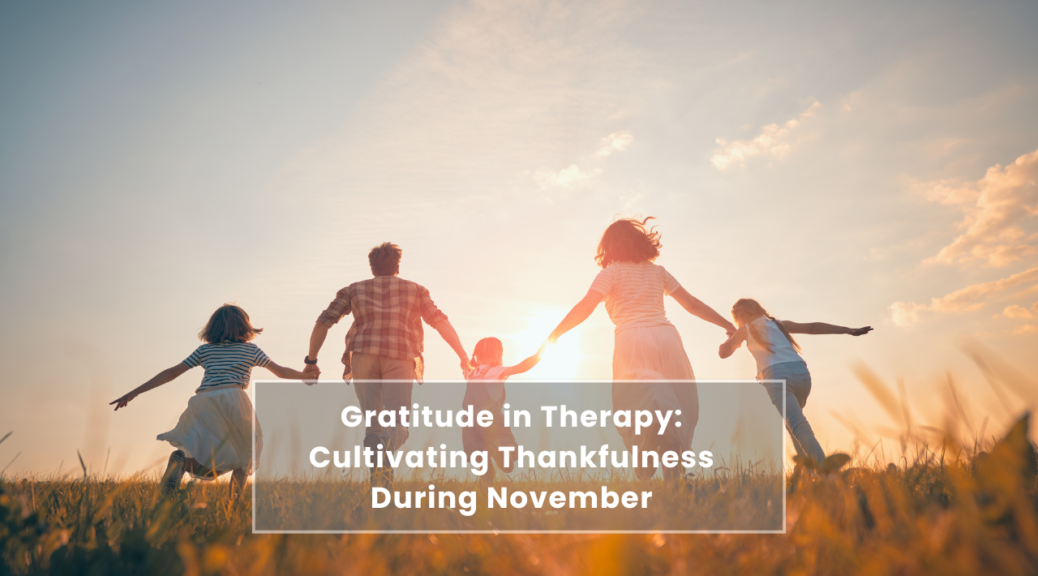November ushers in a season of reflection, a time when many cultures around the world celebrate gratitude, expressing appreciation for the harvest, loved ones, and life’s blessings.
In therapy, cultivating a thankful mindset improves mental health and overall well-being.
Why Gratitude Matters in Therapy
We often seek therapy during challenging times like when struggling with anxiety, depression, relationship issues, or past trauma.
Gratitude offers a way to shift our perspective, focusing on the positive aspects of our lives because it’s easy to get caught in a cycle of negativity.
Here’s how gratitude can benefit you in therapy:
- Reduced Stress and Anxiety: Studies show that gratitude can lower stress hormones and decrease anxiety symptoms. Focusing on what we appreciate activates the brain’s reward system, promoting feelings of calm and well-being.
- Improved Mood and Happiness: Gratitude can boost our mood and increase overall happiness. It helps us savor positive experiences and foster a sense of optimism about the future.
- Stronger Relationships: When we express gratitude to others, it strengthens our relationships. Therapists can help clients develop communication skills to express thankfulness to loved ones, leading to deeper connections.
- Enhanced Resilience: Gratitude helps us develop resilience in the face of challenges. By recognizing the good things in our lives, even during struggles, we build strength and a sense of hope that allows us to persevere.
Cultivating Gratitude in Therapy Sessions
Therapists can guide clients in cultivating a grateful mindset through various practices:
- Gratitude Journaling: Writing down things we’re grateful for each day can shift our focus towards the positive. Your therapist can help you brainstorm what to include.
- Mindfulness Exercises: Mindfulness practices help clients become more aware of their thoughts and feelings. Therapists can guide meditations focusing on appreciation for the present moment.
- Gratitude Letters: Writing thank-you letters to loved ones can be a powerful way to express appreciation and strengthen relationships.
- Identifying Strengths: Recognizing your strengths and accomplishments can boost self-esteem and create feelings of gratitude. Therapists can help clients identify and appreciate their unique strengths.
Gratitude Beyond Therapy
While gratitude is particularly helpful in therapy, it’s a practice that can benefit everyone in daily life. Here are some ways to stay grateful year-round:
- Start Each Day with Gratitude: Take a few minutes each morning to reflect on something you’re thankful for.
- Express Appreciation to Others: Let loved ones know how much you appreciate them through words or actions.
- Savor Positive Experiences: Take time to fully appreciate the good things that happen in life, big or small.
- Practice Random Acts of Kindness: Performing acts of kindness for others can foster feelings of gratitude in both the giver and receiver.
By incorporating these practices into your daily life, you can cultivate a lasting sense of gratitude, boosting your mental well-being and enriching your relationships.
How CCHC Can Help
The Center for Connection, Healing, and Change (CCHC) takes an interdisciplinary approach, interweaving psychotherapy and neuroscience with the timeless wisdom of mindfulness and meditation.
We promote connection, healing, and change in the following areas: couple and family relationships, substance use and processing addictions, depression and/or anxiety, self-worth and identity, sexual life, baby bonding and communication, attachment, experiences of trauma, abuse, and PTSD, childhood experiences and family of origin work, chronic pain and physical illness, military life, parenting, stress management and resilience building, emotional regulation and wellbeing, anger management, spiritual life, behavioral issues, and sexuality.
Our therapists work with couples, children, teens, families, and adults—all from a systemic and holistic perspective.
We are particularly committed to providing services grounded in trauma-informed care, somatic and body-based approaches, and attachment-focused ways of working.
Schedule a free consultation with us today, or visit our offices in Woodbridge or Fairfax.




